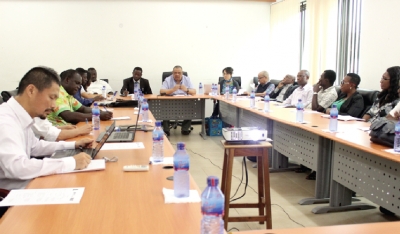
Scientists from Tokyo University of Agriculture and Technology and their counterparts at the University of Ghana, on Monday held a seminar, to discuss how an improved cocoa production technology could be adopted in Ghana to boost cocoa production.
The technology is known as the Japanese-Brazilian System of Successional Agroforestry in Amazon, (SAFTA) and it combines the growing of permanent shade trees and food crops with cocoa on the same piece of land.
It was developed by Japanese immigrants in the Brazilian Amazon to serve as a model for sustainable farm-income generation and environmental conservation.
The seminar was held in Accra on the theme, “Adapting Cocoa-based agriculture to climate change for poverty eradication and sustainable development in Africa - a proposal of the Japanese-Brazilian agroforestry approach
Cocoa sector in Ghana
In his welcome remarks, the Director of the Institute of Applied Science and Technology at the University of Ghana, Professor Oduro Nkansah, said the cocoa production value chain had been bedeviled by several challenges from seed acquisition to marketing.
He submitted that those challenges had caused a slow growth rate of the cocoa sector at a current rate of -2.3 per cent according to the Ghana Statistical Services’ (GSS) data in 2016, although it contributed 9.7 per cent of Ghana’s Gross Domestic Product (GDP).
“It is against this backdrop that the institute, together with its external collaborators from Tokyo, Japan, is organising this seminar to help address some of the key challenges of cocoa production,” he said.
Professor Nkansah said the experts from Japan had already conducted feasibility studies on the SAFTA‘s application to cocoa plantations in Ghana.
He said the seminar also sought to highlight opportunities for a further collaboration on an integrated research, education and extension initiatives regarding SAFTA in Ghana.
Japanese presentation
In a presentation on the theme for the seminar, the Vice Dean of the Institute of Agriculture and Technology, Tokyo, Professor Atushi Chitose, said the proposal included the setting up of a pilot plot to showcase the Brazilian experience.
He said the scope of the project included the use of the pilot plot as a training centre on SAFTA by SAFTA experts in collaboration with their Ghanaian counterparts.
Professor Chitose said through the feasibility study conducted, the team had established that Ghana had the potential to adopt the technology.
In his opening remarks, the Director of the Institute of Environment and Sanitation Studies at the University of Ghana, Professor Chris Gordon, expressed the Institute’s willingness to support the project.
Prof. Gordon, who represented the Vice-Chancellor of the University, Prof Ebenezer Oduro-Owusu, said the plan of the government was to have a green economy, therefore, a good relationship between the Institute and the Japanese project would be a major booster to the country's agricultural sector